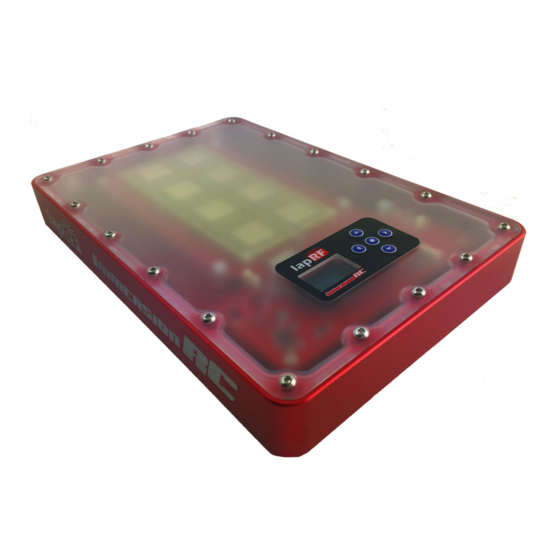
Advertisement
Quick Links
Advertisement

Summary of Contents for Immersion RC LapRF 8-Way Event Timing
- Page 1 LapRF Event Timing System Preliminary Operator's Manual Rev 0.99 - May 2017 ...
-
Page 2: Specifications
Specifications 5.8GHz RF Detection Frequency 5.3-6.0GHz Programmable Attenuation 0-32dB Antenna Custom linearly polarized (Suitable for LHCP, RHCP, Linear use) Channels Arbitrary (defined by connected app.) Pilots 1-16, depending upon required precision and gate speed ... - Page 3 Introduction The LapRF 8-Way Event Timing Edition is the first in a family of race timing systems from ImmersionRC. LapRF technology uses the emitted 5.8GHz RF from race quadcopters (or fixed wing aircraft) to detect a passage through the start-finish gate. ...
-
Page 4: Getting Started
Getting Started The 8-way has been designed to be used by anyone interested in timing an FPV racing event, without special skills. 1) Apply power, and install in the start/finish gate. 2) Hook up the Ethernet cable to either a network, or a direct connection to the timing PC 3) Set an appropriate IP address using the built-in OLED display. ... - Page 5 Heat, the #1 enemy of electronics FPV races are a lot more pleasant when the snow has melted, and the days are long enough for more packs than your charger can keep up with. These spring and summer months closer to the equator brings the sun, and the potential damage that it can cause to electronics used for FPV racing. ...
- Page 6 Limitations In general, you will find the LapRF to be truly best-in-class when it comes to RSSI timing systems. The custom timing modules, coupled with a significant amount of processing power on-board, and some highly refined curve-fitting algorithms , help to run races without an engineer present. The one limitation that we will be very honest about is running the system in indoor environments ...


Need help?
Do you have a question about the LapRF 8-Way Event Timing and is the answer not in the manual?
Questions and answers